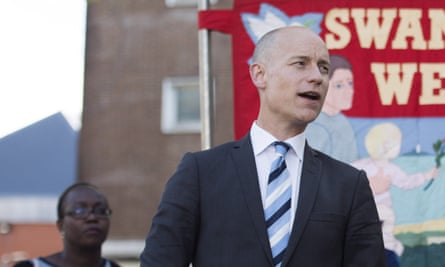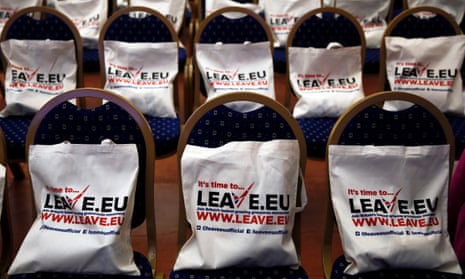The Electoral Commission has been urged to investigate whether Nigel Farage’s Brexit campaign broke election law by not declaring the role of a firm of “psychographic” social media strategists used by Donald Trump.
Ahead of the EU referendum, Leave.EU was advised by Cambridge Analytica (CA), a company hired by Trump which uses artificial intelligence to personalise political messages according to the things voters say and “like” on Facebook. But Leave.EU, which was largely funded by Ukip donor Arron Banks, did not declare CA’s role to the Electoral Commission, according to filings for the campaign published last week.

Stephen Kinnock, a pro-remain Labour MP, has asked the UK’s elections and referendums regulator to urgently “investigate whether it breached provisions in the Political Parties Elections and Referendums Act 2000”.
“The market rate for a donation of this kind could amount to hundreds of thousands of pounds, based on the previous experience of referendum campaigns and political parties for analytical tools,” Kinnock told Claire Bassett, Electoral Commission chief executive, in a letter seen by the Guardian. “Yet Leave.eu has not declared this donation-in-kind at any point in their returns to the Electoral Commission.”
Any substantial additional spending between 15 April last year and the referendum on 23 June would have pushed Leave.EU over the spending limit for the regulated period. They were allowed by law to spend up to £700,000 but according to the accounts they filed they spent £693,000.
CA is backed by Robert Mercer, a billionaire Trump donor, whose daughter Rebekah was part of the White House transition team. He reportedly invested $10m in the rightwing news website Breitbart.
Kinnock questioned Leave.EU’s involvement in “a set of arrangements with a company that seems to be backed by a foreign billionaire and with contributions being made that are not being declared.”
Leave.EU has denied any wrongdoing. Its communications director, Andy Wigmore, said: “[CA] did no work for us formally and if they had it would have been way before you had to report expenditure.”
He branded Kinnock a “remoaner” and “a rabid Europhile”.
The row goes to the heart of claims by Leave.EU that its ability to tailor political messages based on the bulk analysis of data from voters’ social media profiles was a highly potent weapon in June’s tight referendum campaign. Tailored messaging based on analysis of millions of voters’ Facebook posts was also heavily used by Trump in the US general election. The method of using artificial intelligence to devise targeted messaging is also used by Nato to try to counter Russian propaganda in the Baltics. One recent analysis of the technique said it provided “the tools for a guided democracy, one governed by people who can manufacture consent”.
Wigmore told the Guardian: “We never employed CA and they never gave us anything in kind. We met them way before the referendum even started a year before 23 June. We kept in touch that’s all and it’s true that one of their directors participated in our initial press conference to launch Leave.EU in October 2015. Our AI metrics were unique because of the peculiarity of Brexit. CA used the same techniques as we did and vice versa.”

Brittany Kaiser, senior Cambridge Analytica executive, featured on the panel at Leave.EU’s press launch in October 2015 and told the audience: “We are going to be running a bottom-up campaign. We are going to be running large scale research throughout the nation to really understand why people are interested in staying in or getting out of the EU and the answers to that will help inform our policy and communications.”
Wigmore said CA were among supporters and friends who provided ideas and strategy which was then developed by another US political consultancy, Goddard Gunster, which involved employing 20 mathematicians to develop artificial intelligence algorithms to underpin the campaign’s messaging on social media.
He also described to the Observer on Sunday how Mercer introduced CA to Leave.EU.
“[Mercer] said, ‘Here’s this company we think may be useful to you’,” said Wigmore. “What they were trying to do in the US and what we were trying to do had massive parallels. We shared a lot of information. Why wouldn’t you?”
A spokeswoman for the Electoral Commission said it could not comment on specific cases, but highlighted a statement last week from Bob Posner, the regulator’s legal counsel that “the commission will continue to examine campaigners spending returns until it is satisfied that they are complete and accurate”.
Industrial scale targeting of individual voters has been made possible by the boom in how much information people share about themselves on social media and the advance of artificial intelligence algorithms to understand how different types of people can be persuaded by different types of messages. Cambridge Analytica’s British chief executive, Alexander Nix, told a conference last September that as a result “blanket advertising is dead”. He described how CA gathers voters’ social media data and ranks them according to openness, conscientiousness, extroversion, agreeableness (including whether you put others needs and society ahead of yourself) and neuroticism.
He gave the example of a campaign supporting the right to gun ownership: “For a highly neurotic and conscientious audience you are going to need a message that is rational and fear-based,” he said. That could lead to an image of a burglar’s hand smashing a window and a slogan about the second amendment being an insurance policy. For a closed and agreeable audience that cares about family and tradition, the slogan might be: “From father to son, since the birth of our nation” would work better.
People familiar with the technique have described it as “creepy” and “sinister”. But its advocates claim it is highly effective. CA is part of a wider group, Strategic Communications Laboratories, which advises on information warfare to clients including the US defence department attempting to counter Taliban influence in Afghanistan.
Kinnock said: “It is vital for our democracy that the electorate has full information about which organisations are backing which causes, what they are putting in, where they are from and what they do. That is fundamental to any sensible and ethical way of looking at campaign funding.”
